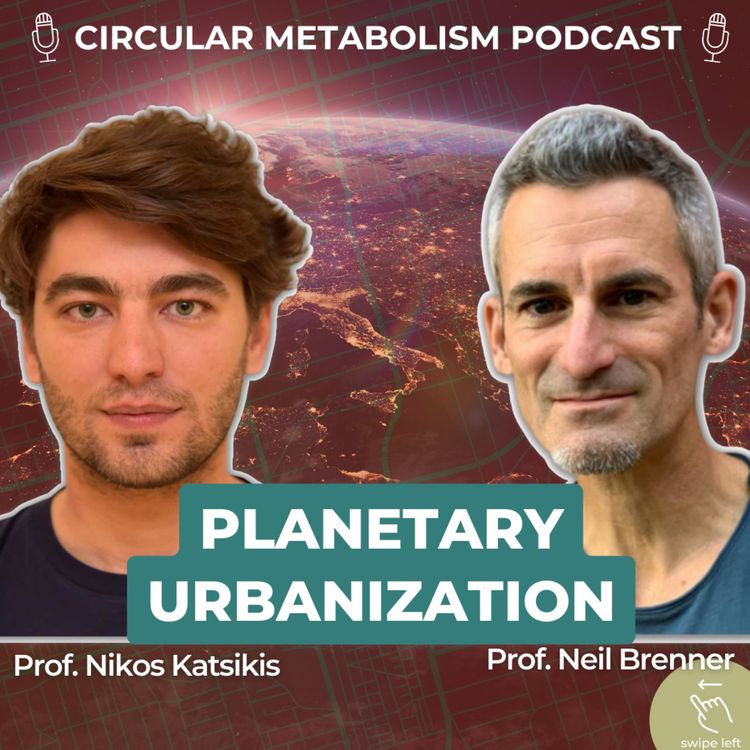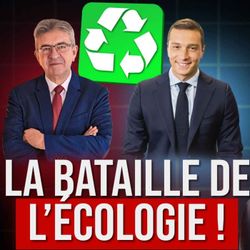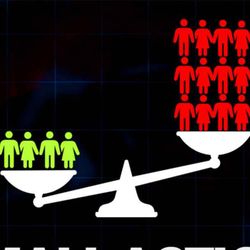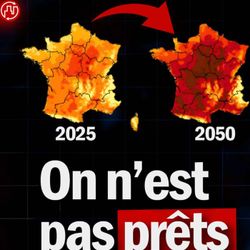Partager

Circular Metabolism Podcast
Planetary Urbanization and Operational Landscapes (Podcast with Neil Brenner and Nikos Katsikis)
📺 Welcome to the 51st episode of the Circular Metabolism Podcast: Planetary Urbanization and Operational Landscapes with Prof. Neil Brenner and Prof. Nikos Katsikis 📺.
🏙️ On today’s episode we will talk about a different way of understanding, representing and interpreting cities through critical urban theory. In general, we all understand cities as the opposite of the rural areas. In fact, most of us have heard or frequently use the UN statistics that more than 50% of global population lives in cities. But that figure embodies a definition and a role of cities. Today, we will challenge this definition and look at the more intricate relationships between the urban and the non-urban through the concept of planetary urbanisation and operational landscapes.
🎓 To talk about this quite fascinating topic I have not one but two guests. On the one hand, Neil Brenner who is Professor of Urban Sociology at the University of Chicago. He is a critical urban theorist, sociologist and geographer who is interested in all aspects of research on cities and urbanization within the social sciences, the environmental humanities, the design disciplines and environmental studies. He has authored and edited numerous books including New Urban Spaces: Urban Theory and the Scale Question and Implosions/Explosions: Towards a Study of Planetary Urbanization. Neil is also one of the major inspirations of this podcast as he was one of the scholars I saw doing a podcast on these topics. On the other hand, I have with me live Nikos Katsikis, who is Assistant Assistant Professor at TU Delft, and Researcher at Urban Theory Lab Chicago, and Future Cities Laboratory, ETH, Zurich. He holds a Doctor of Design from Harvard Graduate School of Design (2016). Nikos is working at the intersection of urbanization theory, design and geospatial analysis. Through conceptual and cartographic experimentation, he helps us understand socio-metabolic relations between agglomerations and their operational landscapes.
🙏 Enjoy this episode and before you go, please help us improve our podcast by subscribing to your favourite app including Youtube, iTunes, Spotify, or Stitcher and leave us a comment 📝 with your thoughts.
👋Hello everyone and Welcome to the Circular Metabolism podcast, the bi-weekly meeting where we have in-depth discussions with thinkers, researchers, activists, policy makers and practitioners to better understand the metabolism of our cities and how to reduce their environmental impact in a socially just and context-specific way.
👀 Youtube: https://youtu.be/0TWtliELSBc
👂 iTunes: https://podcasts.apple.com/be/podcast/circular-metabolism-podcast/id1455115320
👂 Stitcher: https://www.stitcher.com/show/circular-metabolism-podcast
👂 Spotify: https://open.spotify.com/show/13qH9Oj4b0yF0dBidGAdFR
👂 Google: https://podcasts.google.com/feed/aHR0cHM6Ly9mZWVkcy5hY2FzdC5jb20vcHVibGljL3Nob3dzLzYwMWMyYzNlODg4NzQ3NjIyYmY5MzRlNg
#cities #planetaryurbanization #neilbrenner #podcast
More episodes
View all episodes

La Bataille de l'Ecologie va se Jouer sur les Terres et la Liberté - Ouassak & Lempereur-Castelli
01:06:01|📺Ce podcast est 100% indépendant, pour nous aider à le rendre pérenne, c'est ici 👉 https://fr.tipeee.com/circular-metabolism-podcast🔷 SOMMAIRE00:00:00 Introduction00:03:55 Contexte : la montée de l'extrême droite00:11:14 Comment les luttes passées informent le présent ?00:20:36 "L'écologie pour tous" : un mythe ?00:30:32 Le problème de l'absence de projet00:37:32 Comment l'extrême droite parle d'écologie ?00:45:28 Pourquoi la pensée de gauche est paresseuse ?00:48:45 Pourquoi l'extrême droite rassure ?00:52:32 Comment rendre la pensée de gauche audible ?01:02:38 Recommandations🔷 CREDITS00:01:12 : https://youtu.be/BlJvm4cq0dc00:01:15 : https://youtu.be/7yHmQ4iPrhY00:01:28 : https://youtu.be/-1FDSBs-2N8🎤 Interview : Aristide Athanassiadis🎞️ Montage : https://codexprod.fr-------------------------------------------------------------------------------------------------🔷 LIENS VERS LE PODCAST💌 Newsletter: https://www.circularmetabolism.com/👀 Youtube: https://youtu.be/tMx9Q-yDWoY👂 iTunes: https://podcasts.apple.com/be/podcast/circular-metabolism-podcast/id1455115320👂 Spotify: https://open.spotify.com/show/13qH9Oj4b0yF0dBidGAdFR👂 Deezer: https://www.deezer.com/us/show/1001370451🙏 Tipeee: https://fr.tipeee.com/circular-metabolism-podcastSUIVEZ NOUS sur les réseauxLinkedin : https://www.linkedin.com/company/circular-metabolism-podcastTwitter : https://twitter.com/arisathaInstagram : https://www.instagram.com/circularmetabolismpodcast/
Est-ce que la montée du Fascisme est Inévitable ? Johann Chapoutot
01:14:58|📺Ce podcast est 100% indépendant, pour nous aider à le rendre pérenne, c'est ici 👉 https://fr.tipeee.com/circular-metabolism-podcastAujourd’hui, nous allons parler de la montée de l’Extrême Droite un peu partout dans le monde, un danger majeur pour nos sociétés de par leurs politiques et activités liberticides et écocides. En effet, comment se fait-il qu’élection après élection, les partis d’extrême droite s’installent de plus en plus confortablement au pouvoir un peu partout en Europe, en Amérique du Nord comme en Amérique ?Est-ce que la montée du fascisme est un mouvement innarêtable et une fatalité comme le présente les médias mainstream ? Ou en réalité, l’extrême droite est mise au pouvoir par une poignée de personnes ?La réponse se trouve peut-être dans le virage politique qu’a subi l’Allemagne entre 1930 et 1933, lorsque le nazisme a vu le jour alors qu’il semblait s’effondrer. Vous êtes sur le podcast Circular Metabolism, le podcast pour mieux comprendre le métabolisme de nos sociétés et leurs impacts socio-environnementaux.Pour parler de ces sujets, j’ai le plaisir d'accueillir Johann Chapoutot. Johann est professeur d’histoire contemporaine à la Sorbonne. Ses travaux portent sur l’Allemagne et la modernité occidentale. Il a écrit de nombreux ouvrages et je le reçois aujourd’hui pour son dernier livre : Les Irresponsables, Qui a porté Hitler au pouvoir ? Dans cet épisode nous allons - examiner les répercussions tragiques de la montée actuelle du fascisme- décortiquer la suite des événements qui ont mené la nazisme au pouvoir- et tirer des parallèles avec la situation politique actuelle de la France et de l’Europe🔷 SOMMAIRE00:00:00 Introduction00:04:13 1930 et 2025 : périodes jumelles ?00:09:56 Les facettes cachées du nazisme00:18:26 Les faux récits et les vrais responsables00:26:42 La méthode du _raisonnement contrefactuel_00:31:58 Les étapes de la montée du nazisme00:44:47 Les personnages clés du nazisme01:01:27 Quels parallèles avec aujourd'hui ?01:12:03 Que faire de ces apprentissages ?🔷 CREDITS🎤 Interview : Aristide Athanassiadis🎞️ Montage : https://codexprod.fr-------------------------------------------------------------------------------------------------🔷 LIENS VERS LE PODCAST💌 Newsletter: https://www.circularmetabolism.com/👀 Youtube: https://youtu.be/6HjHwpXd4EA👂 iTunes: https://podcasts.apple.com/be/podcast/circular-metabolism-podcast/id1455115320👂 Spotify: https://open.spotify.com/show/13qH9Oj4b0yF0dBidGAdFR👂 Deezer: https://www.deezer.com/us/show/1001370451🙏 Tipeee: https://fr.tipeee.com/circular-metabolism-podcast
Comment Prendre Soin de la Technosphère ?
01:18:01|📺Ce podcast est 100% indépendant, pour nous aider à le rendre pérenne, c'est ici 👉 https://fr.tipeee.com/circular-metabolism-podcastAujourd’hui nous allons parler de la notion de “technosphère”, c’est-à-dire tous les objets, outils et infrastructures qui forment le socle matériel de nos sociétés modernes, et qui nous entourent au quotidien tout en passant inaperçus.Cependant, pour que cette technosphère fonctionne, il est nécessaire qu’elle soit sans cesse maintenue. A une époque où l’innovation est au centre de l'attention, on invisibilise les personnes qui maintiennent l’ensemble de cette trame matérielle, assurant la satisfaction de nos besoins. Vous êtes sur Circular Metabolism, le podcast pour mieux comprendre le métabolisme de nos sociétés et leurs impacts socio-environnementaux.Pour parler de ces sujets, j’ai le plaisir d'accueillir Jérôme Denis. Jérôme est professeur de sociologie aux Mines de Paris. Ses travaux se focalisent sur la notion de maintenance, à travers des enquêtes ethnographiques sur le terrain avec différentes activités de la ville. Il a notamment co-écrit Le Soin des Choses - Politiques de la Maintenance. Dans cet épisode, nous allons explorer :- Ce qu’est vraiment la technosphère ;- Les différents pièges que son invisibilisation produit ;- Et pourquoi parler de sa maintenance est en réalité un acte politique de grande importance.🔷 SOMMAIRE00:00:00 Introduction00:01:50 Qu'est-ce que la technosphère ?00:07:45 Liens entre techno/socio/biosphère00:14:22 La notion "d'infra-ordinaire"00:23:26 Le piège de (l'inter)dépendance00:30:24 La notion de "maintenance"00:53:10 Les 3 enquêtes du livre01:04:42 Maintenir ou démanteler ?01:14:58 Recommandations01:17:52 Crédits▶️ ÉPISODES CITÉS• Michel Lussault - https://youtu.be/qXk2qB6vH2A• Alexandre Monnin - https://youtu.be/wx6wTuqkTGg• Olivier Coutard - https://youtu.be/gfRO4923Fiw• Nelo Magalhães - https://youtu.be/ujwQaYpzyoQ• François Jarrige - https://youtu.be/rZ3beT0LpaU🔷 CRÉDITS🎤 Interview : Aristide Athanassiadis🎞️ Montage: https://codexprod.fr-------------------------------------------------------------------------------------------------🔷 LIENS VERS LE PODCAST💌 Newsletter: https://www.circularmetabolism.com/👀 Youtube: https://youtu.be/fRqcG8jXrZg👂 iTunes: https://podcasts.apple.com/be/podcast/circular-metabolism-podcast/id1455115320👂 Spotify: https://open.spotify.com/show/13qH9Oj4b0yF0dBidGAdFR👂 Deezer: https://www.deezer.com/us/show/1001370451
Les 3 Matériaux Régénératifs qui Peuvent Sauver l'Architecture - Dominique Gauzin-Müller
56:30|📺Ce podcast est 100% indépendant, pour nous aider à le rendre pérenne, c'est ici 👉 https://fr.tipeee.com/circular-metabolism-podcastAujourd’hui nous allons parler du poids climatique et écologique du secteur de la construction. En effet, il est responsable d’environ la moitié des extractions de ressources et 40% des émissions de carbone au niveau global via la construction et le chauffage de bâtiments. Face à ce constat, pouvons nous réparer le secteur de la construction et ménager notre rapport aux écosystèmes et si oui comment ? Et quelle est la place des matériaux de construction régénératifs, biosourcés et géosourcés dans cette quête. Pour parler de ces sujets, j’ai le plaisir d’accueillir Dominique Gauzin-Müller. Dominique est architecte et chercheuse. Elle travaille depuis 40 ans à la promotion d’une architecture différente, plus en phase avec les enjeux socio-écologiques. Elle est l’auteure de 25 ouvrages et elle est commissaire de nombreuses expositions itinérantes, dont « Materia architecture ». En 2018 elle a lancé le Mouvement pour une frugalité heureuse et créative dans l’architecture et le ménagement des territoires.Dans cet épisode nous allons donc faire un bref diagnostic du secteur de la construction, parler du mouvement pour une frugalité heureuse et créative et finalement parler du potentiel des matériaux régénératifs. Cet épisode a été enregistré durant le Festival Building Beyond : https://building-beyond.eventmaker.io/-------------------------------------------------------------------------------------------------🔷 LIENS VERS LE PODCAST💌 Newsletter: https://www.circularmetabolism.com/👀 Youtube: https://youtu.be/mS7qEjFQ5p4👂 iTunes: https://podcasts.apple.com/be/podcast/circular-metabolism-podcast/id1455115320👂 Spotify: https://open.spotify.com/show/13qH9Oj4b0yF0dBidGAdFR👂 Deezer: https://www.deezer.com/us/show/1001370451🙏 Tipeee: https://fr.tipeee.com/circular-metabolism-podcast
Les Rouages (Cachés) des Ultras Riches pour Exploiter la Planète - Monique Pinçon-Charlot
01:03:49|📺Ce podcast est 100% indépendant, pour nous aider à le rendre pérenne, c'est ici 👉 https://fr.tipeee.com/circular-metabolism-podcastAujourd’hui nous allons parler de comment la classe des Ultra Riches saccage le climat à travers leurs accumulations et exploitations sans fin.Nous entendons souvent que les Riches sont responsables de la majorité des pollutions. Mais qui sont réellement ces ultra riches ? Comment exercent-ils leurs pouvoirs ? Et quels types de violences infligent-ils au reste de la société et de la planète ?Vous êtes sur le podcast Circular Metabolism, le podcast pour mieux comprendre le métabolisme de nos sociétés et leurs impacts socio-environnementaux.Pour parler de ces sujets, j’ai le plaisir d'accueillir Monique Pinçon-Charlot. Monique est sociologue, ancienne directrice de recherche au CNRS et spécialiste des grandes fortunes françaises.Elle a écrit de nombreux ouvrages et je la reçois aujourd’hui pour son dernier livre : Les Riches Contre la Planète, Violence Oligarchique et Chaos Climatique.🔷 SOMMAIRE00:00:00 Introduction00:02:16 Un livre construit comme un puzzle00:10:30 Qu'est-ce qu'une classe sociale ?00:24:38 Comment fonctionnent les riches ?00:37:57 Les mécanismes du Capitalocène00:50:00 A69, un bijou oligarchique00:55:46 Quelle place pour la science ?01:01:10 Recommandations01:03:40 Crédits🔷 RÉFÉRENCES00:03:37 Michel Pinçon - Sociologue des élites et époux de Monique Pinçon-Charlot00:39:03 World inequality report 2022 - https://wir2022.wid.world/00:39:10 Comment les riches ravagent la planète - BD de Hervé Kempf & Juan Mendez00:45:46 La croissance verte contre la nature - Livre de Hélène Tordjman01:01:59 De la guerre froide à la guerre verte - Film de Anna Recalde Miranda▶️ ÉPISODES CITÉS00:21:47 Bernard Friot - https://youtu.be/W5RKMHo7FzU00:56:28 Scientifiques en Rébellion - https://youtu.be/bR2obRwMCh000:56:32 Wolfgang Cramer - https://youtu.be/cBWAr6lhbqE01:03:23 Daniel Tanuro - https://youtu.be/wM830JQJnxQ01:03:32 Farhana Sultana - https://youtu.be/b1POxzUjWSc🔷 CRÉDITS🎤 Interview : Aristide Athanassiadis🎞️ Montage: https://codexprod.fr-------------------------------------------------------------------------------------------------🔷 LIENS VERS LE PODCAST💌 Newsletter: https://www.circularmetabolism.com/👀 Youtube: https://youtu.be/TZ9bq7PvWF8👂 iTunes: https://podcasts.apple.com/be/podcast/circular-metabolism-podcast/id1455115320👂 Spotify: https://open.spotify.com/show/13qH9Oj4b0yF0dBidGAdFR👂 Deezer: https://www.deezer.com/us/show/1001370451🙏 Tipeee: https://fr.tipeee.com/circular-metabolism-podcast
The (Real) Reason Why We Can’t Solve the Climate Crisis - Helmut Haberl
01:19:50|📺Ce podcast est 100% indépendant, pour nous aider à le rendre pérenne, c'est ici 👉 https://fr.tipeee.com/circular-metabolism-podcastToday, we will focus on the topic of societal lock-ins. While cities and countries are heavily investing in renewable energy and low-carbon technologies we fail to see an overall reduction of our emissions. Indeed, our current infrastructures are locking us into consuming more and more resources and emitting more and more pollution. So how do we get out of this vicious circle ? And is it possible to use infrastructures to lock us into more just and desirable futures ? To help us navigate these questions, I have with me today Professor Helmut Haberl. Helmut is a at BOKU university, in the Institute of Social Ecology. His research focuses on the relationship between our resource use, their associated infrastructures and the services they provide to society. Welcome to the Circular Metabolism podcast, where we have in-depth discussions with researchers to better understand the metabolism of our societies and how to reduce their socio-ecological impact in a systemic, socially just and context-specific way.🔷 CHAPTERS0:00:00 Introduction0:01:53 l What is socio-ecological metabolism ?0:19:07 The relationship between stocks and flows0:31:40 The saturation effect0:44:44 The relationship between stocks and GDP0:53:29 Is a sustainable state achievable ?1:00:51 The dismantling issue1:10:48 Which future topics to tackle ?1:19:07 Conclusion🔷 REFERENCES0:00:56 https://youtu.be/1rNpchlC6ns 0:12:27 https://youtu.be/YKVrTYNjvpA0:19:51 The global agrarian-industrial transition, Krausmann et al (2017)0:36:01 https://onlinelibrary.wiley.com/doi/full/10.1111/jiec.13575🔷 CREDITS🎤 Interview: Aristide Athanassiadis🎞️ Editing: https://codexprod.fr-------------------------------------------------------------------------------------------------🔷 LIENS VERS LE PODCAST💌 Newsletter: https://www.circularmetabolism.com/👀 Youtube: https://youtu.be/XYzcHVhr-6w👂 iTunes: https://podcasts.apple.com/be/podcast/circular-metabolism-podcast/id1455115320👂 Spotify: https://open.spotify.com/show/13qH9Oj4b0yF0dBidGAdFR👂 Deezer: https://www.deezer.com/us/show/1001370451🙏 Tipeee: https://fr.tipeee.com/circular-metabolism-podcast
How a SMALL Minority Could SOLVE the Climate Crisis - Ilona Otto
01:16:53|📺Ce podcast est 100% indépendant, pour nous aider à le rendre pérenne, c'est ici 👉 https://fr.tipeee.com/circular-metabolism-podcastHello everyone and Welcome to the Circular Metabolism podcast, where we have in-depth discussions with researchers to better understand the metabolism of our societies and how to reduce their socio-ecological impact in a systemic, socially just and context-specific way.Today, we will focus on the topic of societal tipping points. Indeed, to address the current social and ecological crises, traditional policies have become irrelevant both in timeframe and impact points of view. To address these crises we need new ways to propose policies that can spark fast and radical change. To identify these actions we need to better understand the concept of societal tipping points or in other words how small and targeted changes can have disproportionate effects. So what are societal tipping points, how can we implement them at a local and global level, and how can they help us address both social and ecological crises ?To help us navigate these questions, I have with me today Professor Ilona Otto. Ilona holds the Professorship in Societal Impacts of Climate Change at the University of Graz. She leads a research group focusing on Social Complexity and System Transformation. Her research focuses on social dynamic processes and interventions that are likely to spark rapid social changes necessary to radically transform the interactions of human societies with nature and ecosystem services in the next 30 years.🔷 SOMMAIRE 00:00:00 Introduction00:02:48 What is a tipping point?00:10:02 Tipping points and planetary boundaries00:17:51 Societal tipping points00:28:37 Inequalities & colonialism00:34:14 Ilona Otto's paper00:50:27 Talking to the individuals01:02:08 The Pareto principle01:05:25 Power games01:09:45 RecommendationsSource of illustration : Otto, I. M., Donges, J. F., Cremades, R., Bhowmik, A., Hewitt, R. J., Lucht, W., ... & Schellnhuber, H. J. (2020). Social tipping dynamics for stabilizing Earth’s climate by 2050. Proceedings of the National Academy of Sciences, 117(5), 2354-2365.🔷 CREDITS🎤 Interview : Aristide Athanassiadis🎞️ Montage: https://codexprod.fr-------------------------------------------------------------------------------------------------🔷 LIENS VERS LE PODCAST💌 Newsletter: https://www.circularmetabolism.com/👀 Youtube: https://youtu.be/cFELZxX1F2U👂 iTunes: https://podcasts.apple.com/be/podcast/circular-metabolism-podcast/id1455115320👂 Spotify: https://open.spotify.com/show/13qH9Oj4b0yF0dBidGAdFR👂 Deezer: https://www.deezer.com/us/show/1001370451🙏 Tipeee: https://fr.tipeee.com/circular-metabolism-podcast
Peut-on (vraiment) s'adapter à +4°C ? Ilian Moundib
01:37:57|📺Ce podcast est 100% indépendant, pour nous aider à le rendre pérenne, c'est ici 👉 https://fr.tipeee.com/circular-metabolism-podcastEcole fermés, sécheresse et canicule record, agriculture en péril, nous venons de vivre du “jamais vu” pour un mois de juin. Mais surtout ce mois de juin semble être un avant-goût de la France de demain. Comment s’adapter à ce nouveau climat qui semble tout aussi incertain que en conflit avec nos modes de vies actuels ? Pourra-t-on tout simplement avoir de l’agriculture ? Les villes vont-elles être vivables demain ? Pourra-t-on vivre en Méditerranée et le long de la côte ? Aujourd’hui nous allons décortiquer le concept d’Adaptation au changement climatique, parler de bons et de mauvais exemples d’adaptation face aux inondations, sécheresses et incendies qui vont se démultiplier dans les années qui viennent. Mais nous allons aussi parler de quels projets de société pouvons-nous construire autour de l’adaptation ?Vous êtes sur CM, le podcast pour mieux comprendre le métabolisme de nos sociétés et leurs impacts socio-écologiques. Pour parler de ces sujets, j’ai le plaisir d'accueillir Ilian Moundib. Ilian est ingénieur et expert en résilience climatique. Il est l’auteur du livre S’adapter au Changement Climatique dans la collection Fake or Not.🔷 SOMMAIRE 00:00:00 Introduction00:03:14 Qu'est-ce que l'adaptation ?00:11:17 Les principaux risques à venir ?00:34:02 Géopolitique de l'adaptation00:49:36 Déplétion énergétique et matérielle00:57:19 Le plan national d'adaptation est-il suffisant ?01:17:41 Quel projet de société pour l'adaptation ?🔷 CRÉDITS🎤 Interview : Aristide Athanassiadis🎞️ Montage: https://codexprod.fr-------------------------------------------------------------------------------------------------🔷 LIENS VERS LE PODCAST💌 Newsletter: https://www.circularmetabolism.com/👀 Youtube: https://youtu.be/hPCYrHsPKoE👂 iTunes: https://podcasts.apple.com/be/podcast/circular-metabolism-podcast/id1455115320👂 Spotify: https://open.spotify.com/show/13qH9Oj4b0yF0dBidGAdFR👂 Deezer: https://www.deezer.com/us/show/1001370451🙏 Tipeee: https://fr.tipeee.com/circular-metabolism-podcastSUIVEZ NOUS sur les réseauxLinkedin : https://www.linkedin.com/company/circular-metabolism-podcastTwitter : https://twitter.com/arisathaInstagram : https://www.instagram.com/circularmetabolismpodcast/
Géoingénierie : Allons nous ouvrir la boîte de Pandore ?
01:13:28|📺Ce podcast est 100% indépendant, pour nous aider à le rendre pérenne, c'est ici 👉 https://fr.tipeee.com/circular-metabolism-podcastAujourd’hui nous allons parler de Géoingénierie.Ce sujet, qui n'était autrefois vu que comme un projet d'apprentis sorciers, est aujourd'hui présent dans tous les plans climatiques gouvernementaux.Mais comment la géo-ingénierie s’est infiltrée dans les sphères politiques et que cache réellement ce concept ? Quels sont concrètement les projets de géoingénierie, sont-ils vraiment viables, et à quels risques nous exposent-ils ?Entre fuite en avant, technosolutionnisme, et enjeux géopolitiques, quelles intentions motivent réellement la géoingénierie ?Pour parler de ces sujets, j’ai le plaisir d'accueillir Marine De Guglielmo Weber. Marine est docteure en sciences de l'information et de la communication, chercheuse au sein de l'Institut de recherche stratégique de l'école militaire, directrice scientifique de l'Observatoire Défense & Climat et auteur de différents ouvrages dont Le Grand Retournement et La Géopolitique des Nuages. 🔷 SOMMAIRE 00:00:00 Introduction00:02:37 Les 3 piliers de la géoingénierie00:04:29 Les 2 types de géoingénierie00:10:15 Qui sont les géoingénieurs ?00:12:44 Les dilemmes de la géoingénierie00:23:54 L'histoire de la géoingénierie00:31:10 Risques de la géoingénierie00:39:14 Liens entre géoingénierie et scientisme/patriarcat00:46:41 Géoingénierie à l'échelle locale ?00:48:11 La technique de l'ensemencement00:59:15 Gouvernance de la géoingénierie01:05:51 Que faut-il faire maintenant ?01:10:54 Recommandations🔷 CRÉDITS🎤 Interview : Aristide Athanassiadis🎞️ Montage: https://codexprod.fr-------------------------------------------------------------------------------------------------🔷 LIENS VERS LE PODCAST💌 Newsletter: https://www.circularmetabolism.com/👀 Youtube: https://youtu.be/rXwKs45sKRU👂 iTunes: https://podcasts.apple.com/be/podcast/circular-metabolism-podcast/id1455115320👂 Spotify: https://open.spotify.com/show/13qH9Oj4b0yF0dBidGAdFR👂 Deezer: https://www.deezer.com/us/show/1001370451🙏 Tipeee: https://fr.tipeee.com/circular-metabolism-podcastSUIVEZ NOUS sur les réseauxLinkedin : https://www.linkedin.com/company/circular-metabolism-podcastTwitter : https://twitter.com/arisathaInstagram : https://www.instagram.com/circularmetabolismpodcast/